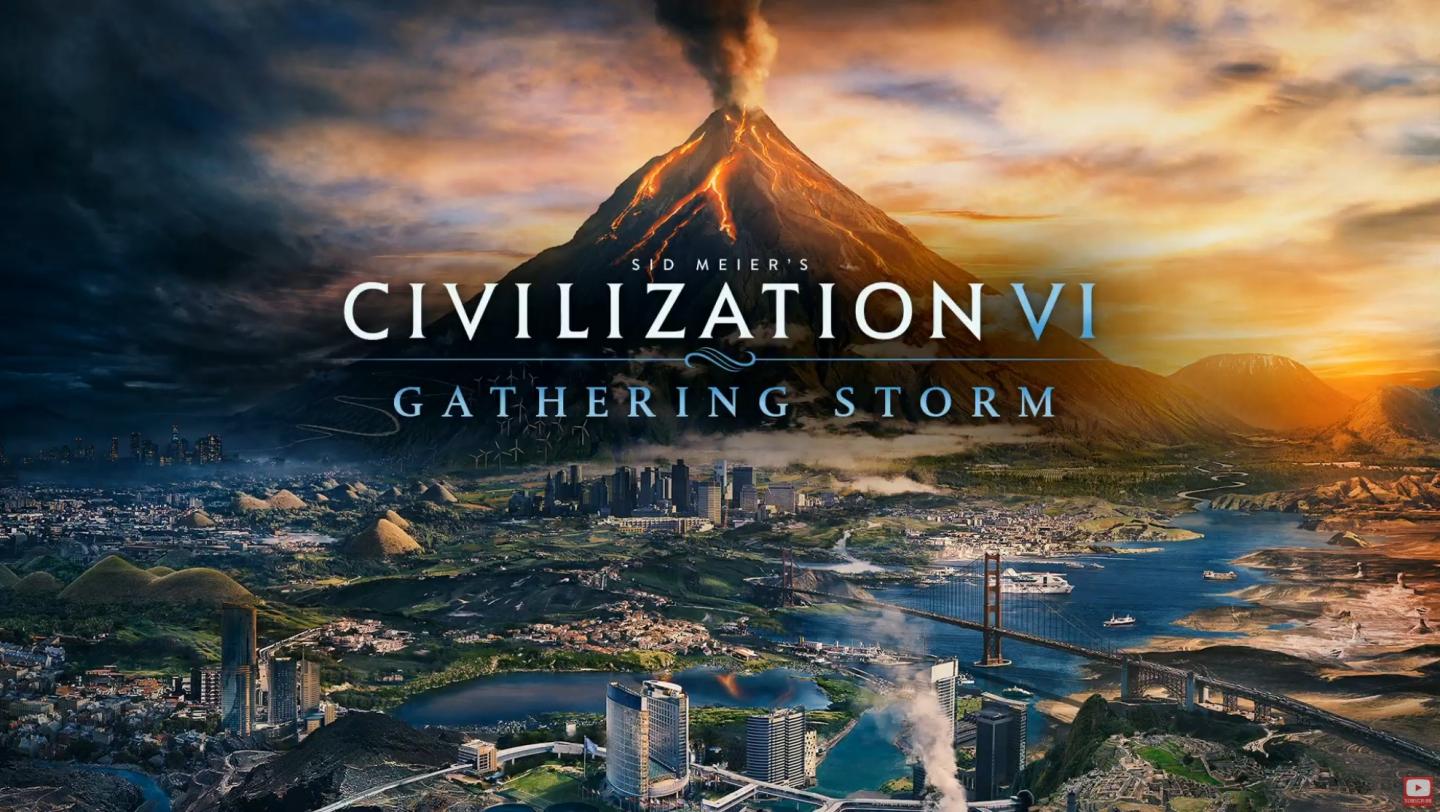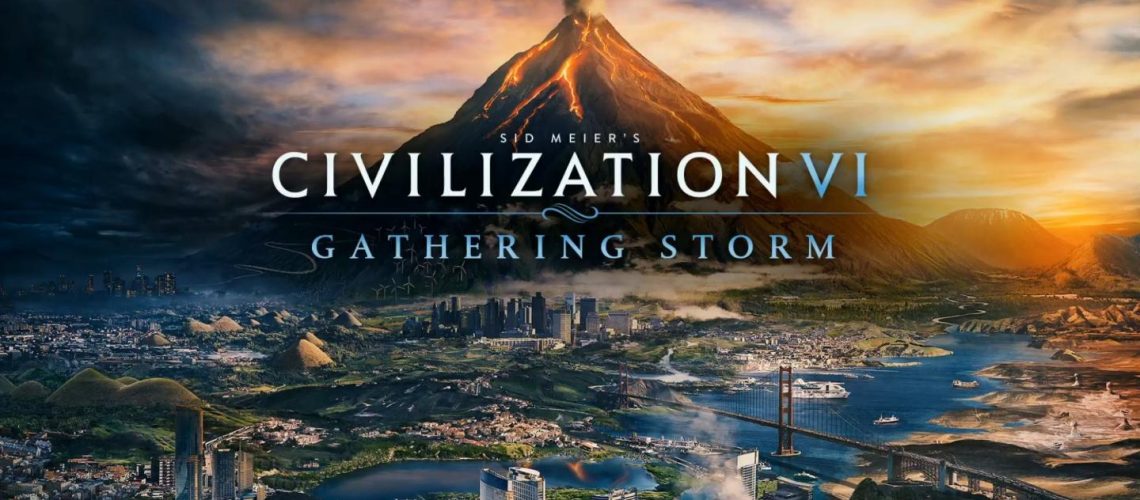The Aztecs are sorely pressing Sweden, having taken a number of their cities. Greece is exploring, sending caravels across the wide ocean and making contact with the Phoenicians at Ugarit. The Arab-Chinese war is turning hot again. And the Zulu have asked the Phoenicians to join them in a glorious war against the Dutch. The Phoenicians politely have refused.
Wait! This is not the latest Alternate History novel from Harry Turtledove. This is my latest game session of Civilization 6 using the latest expansion, Gathering Storm.
Civilization 6: Gathering Storm adds new a new gameplay format, civs, and mechanics to provide a Civilization game resonant with our climate change age.
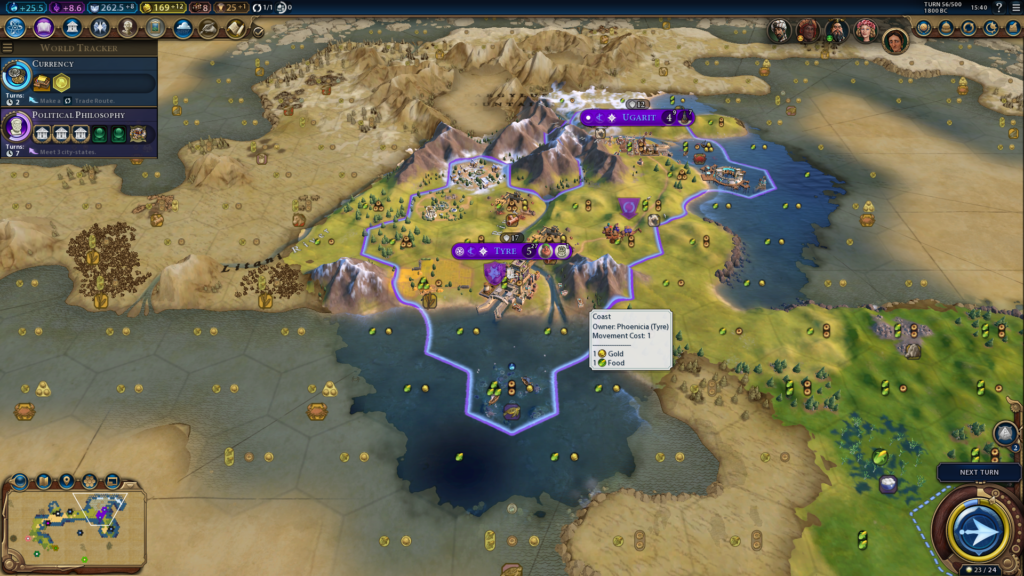
The Civilization series has been one of my core video game series, having played every iteration of the game and many of it’s descendants and spin offs (See my 2014 Skiffy and Fanty review of Civilization: Beyond Earth). Some of my most favorite memories of my late friend Scott Olson was game after game on his home LAN. He, a tactical mastermind, always played Germany and won most of the time against me — but not every time. Sometimes my Legions won the day. But Civ is the classic 4x game. From the ancient age to modern times, grow your civ, explore the world, and build a civilization that can stand the test of time. Your Roman legions might clash with Mongol horsemen. Or American musketmen. Or you might try building the Eiffel Tower in Canberra. Or have the Phoenicians build the Golden Gate Bridge. As you do.
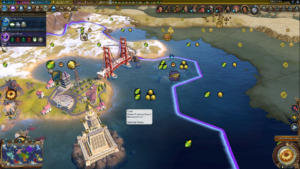
Civilization 6 is the latest iteration of the game, and Gathering Storm is it’s brand new expansion. For the first time since Civilization III, the effects of global warming are seriously implemented in a Civ game (Civ IV had it in a very minor way, and Civ V and base Civ VI did not have it at all). In addition to global warming, other natural disasters are possible in the game: hurricanes, sand storms, river floods, and volcanic eruptions. While storms and even eruptions can sometimes leave behind fertilized tiles, global warming is all bad, causing low lying tiles to become submerged and unusable.
The endgames to the last couple of Civ games have had a case of just playing out the string. Conquer more of the AI’s city. Push for the culture win. Build the spaceship. The addition of the global warming mechanic means that the end of the game brings new situations and new problems to deal with. All those coal power plants you built could turn and bite you as the seas rise and you lose tiles and population. Other natural disasters provide an x-factor to provide some unpredictability and change to the “going through the motions” method to get to the win. It gives the endgame of Civ a feel of “one more turn, I’ve got to deal with this flood now” rather than “Blah, ten more turns to win.”
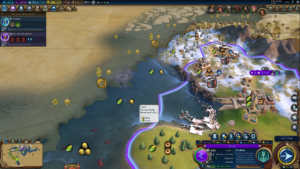
The game doesn’t quite go as vicious as Civ 2 or 3 did with global warming, which had severe and increasing desertification of the map as time went on. A late game where players are pumping out CO2 like mad will cause lots of tiles to flood, but there is an ultimate limit to the damage that global warming can do, which is a shame. While death spirals are not entirely fun to play, it does lean into the theme of the game that the Earth can be an angry place and that putting too much crap into the air has consequences for the entire planet. However, the game does try and address climate change by making it clear in the mechanics who or what is responsible. One of the screens shows just who is the biggest contributor to the problem. It likewise offers technologies that can be researched to try and slow global warming.
Civ 6: Gathering Storm has a couple of other additional new mechanics. One is a diplomatic component involving the World Congress and a clearer sense for how other in-game civs relate to the player. The old AI civs hated you for opaque reasons or held grudges for centuries. In the base Civ 6, if you started a war with Greece in 100 BC, their ally the darned Egyptians still won’t trust you in 1900 AD. The system of grievances in this new system quantifies bad behavior that other civs feel that you did, and those grievances go away over time. You can get a better feel for why Civs hate you now. Additionally, the World Congress provides new ways for Civs to interact, and you can win with diplomatic victory points awarded over time by the Congress. Diplomatic points are also quirky. The Statue of Liberty, a late game wonder, now gives 2 points toward the 10 needed for victory, removing the reliance on relatively useless late game settlers after most of the good land has long since been snapped up.
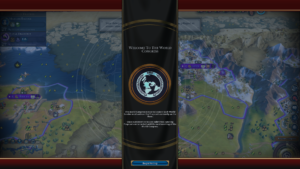

Culture victories get some freshening up too. Build a ton of wonders, get great works, and hope people visit. It IS kind of dull. Wait wait wait.Gathering Storm provides a mechanic to actively push that with the new Rock Bands. Rock bands are a lot of fun. Rock bands, however, let you purchase with faith points, units that can travel to other civs and boost your tourism. The bands sometimes fail, but sometimes they become a hit, which makes the culture game more dynamic. And all those faith points you accumulated since getting a religion are useful for something other than making national parks. It makes the faith point mechanic much more useful in the late game.
Memorably in one game of Civ, I played as Rome, smashing the world with armies and science. Out of nowhere, the Canadians began sending me rock band after rock band in an attempt to get a culture victory out from under me. It was kind of funny that I, the dominant power in the world, was being undermined by Canadian rock and roll. Author Scott Lynch found my plight particularly funny: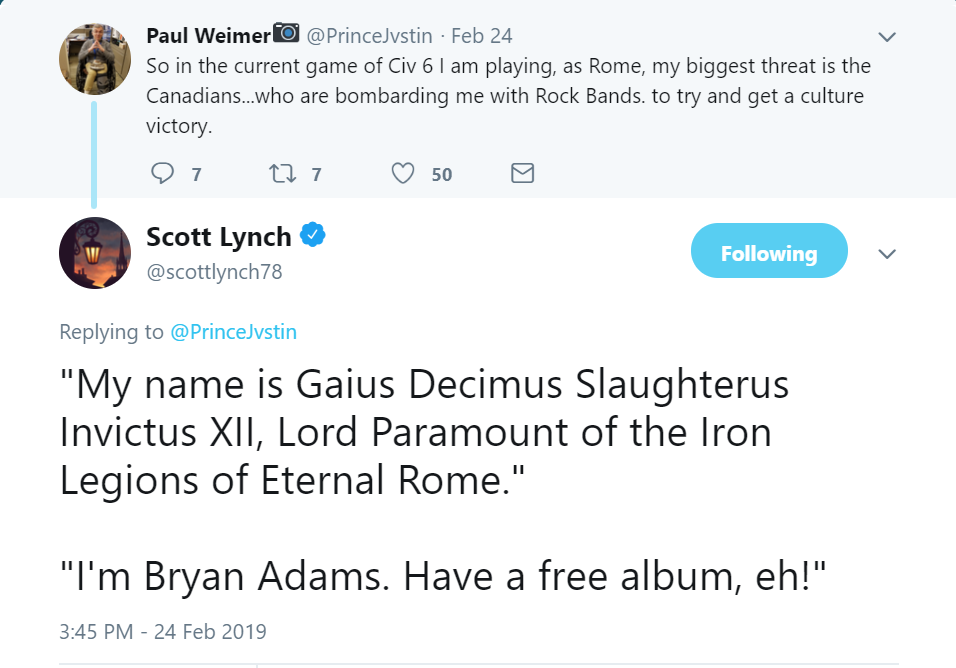
I did eventually win, but only because I started to make rock bands of my own to fight fire with fire and stall the Canadian push long enough to launch a spacecraft for to win.
The game also has new civs with a whole bunch of new mechanics. The aforementioned Canadians cannot have surprise wars declared on them. The Inca, alone of all civilizations, can work mountain tiles. Phoenicia can move its capital. Mali gets absurdly high gold and faith bonuses and can buy units easily; however, it can’t produce things all that well, making their early game challenging. Suleiman of the Ottomans is geared entirely toward conquering other civs, missing many of the penalties a pugnacious game creates. In fact, their unique unit, the Janissary, is best built in a city you have previously conquered.
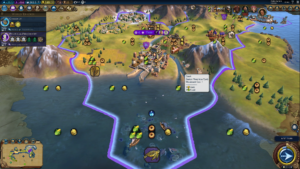
And then there’s the Maori. The Maori do not start at a suggested location like any other civ in any other game of Civilization. No, their settler starts in the middle of the ocean, out of sight of land. The Maori have to find land, and then settle it. Given that all of the other civs start on land, this means that the Maori have to find and squeeze in, if not outright fight, for their slice of the world. They get strong bonuses to make up for this, including a special building that gives them really strong (probably TOO strong) bonuses for tiles that haven’t been chopped down or mined or industrialized. You can see where this is going. The Maori really lean in to the game without trying to be a dirty, high power civilization that drives global warming. In fact, if you have the Maori as an AI, building that coal power plant will not make your Maori neighbors happy at all.
Civilization 6: Gathering Storm gives a new and different perspective to playing the newer Civs and the older ones alike. I think some of the aspects of the climate change and natural disasters could be sharpened, and the Maori ARE a bit too powerful if they get any sort of luck in their initial starting location, but Civilization 6: Gathering Storm brings a perspective to the game that has been lacking for a long time.
Now if you will excuse me, the Chinese and the Dutch have just declared on me. Gotta go deal with that. Just one more turn…
